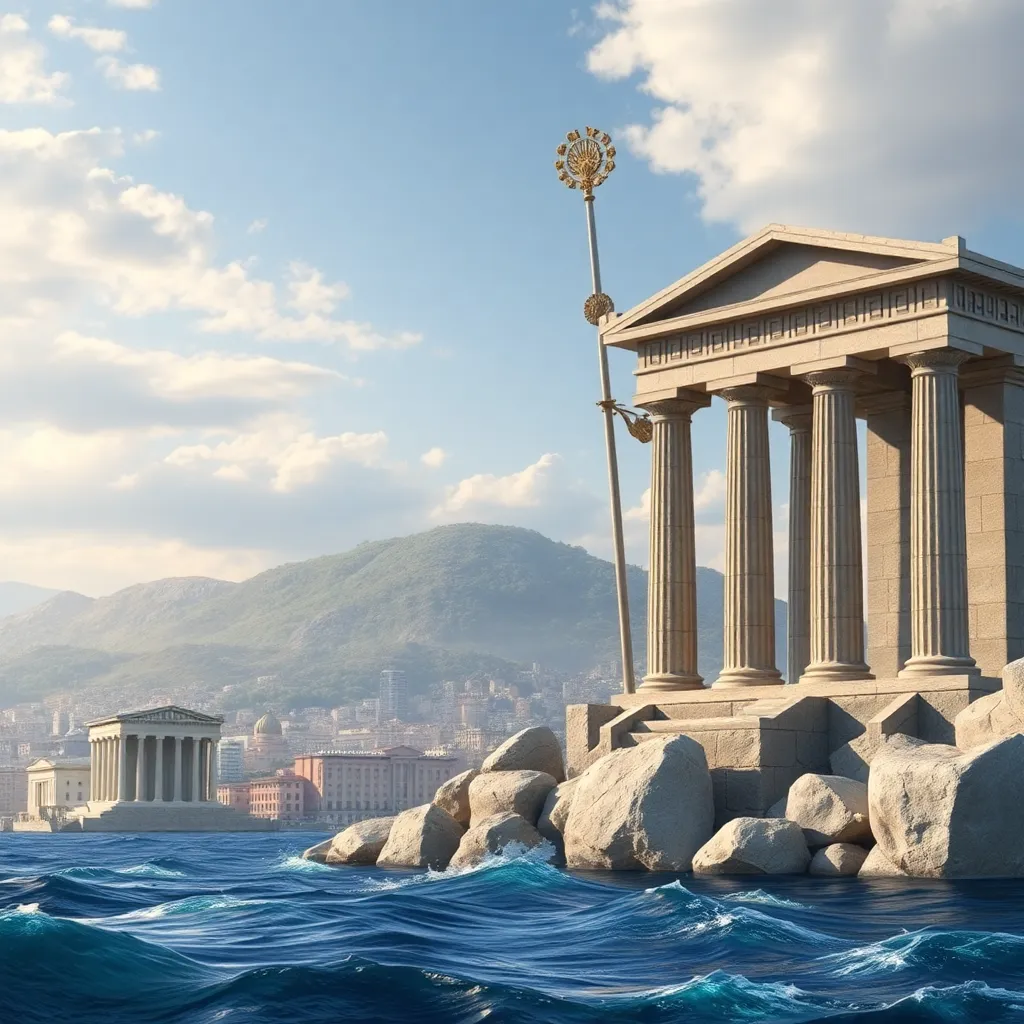The Connection Between Poseidon and the City of Athens
I. Introduction
Poseidon, one of the Twelve Olympian deities in Greek mythology, is a prominent figure revered as the god of the sea, earthquakes, and horses. His significance stretches far beyond the waters, impacting various aspects of ancient Greek life and culture. The city of Athens, a pivotal center of politics, philosophy, and art in ancient Greece, holds a complex relationship with Poseidon that is tied to its foundational myths and cultural identity.
This article aims to explore the intricate relationship between Poseidon and Athens, delving into mythological narratives, historical contexts, and the lasting impact of this connection on Athenian society.
II. The Mythological Background of Poseidon
Poseidon is often depicted holding a trident, symbolizing his dominion over the oceans and his ability to cause storms and earthquakes. As a brother to Zeus and Hades, he occupies a significant place in the pantheon of Greek gods.
- Role of Poseidon: God of the sea, protector of sailors, and associated with horses and earthquakes.
- Family: Son of Cronus and Rhea, brother of Zeus and Hades, and father to various sea creatures and demigods.
- Key Myths: His rivalry with Athena for the patronage of Athens, his involvement in the Trojan War, and the creation of the horse.
Poseidon is also associated with various symbols, including horses, dolphins, and the trident, all of which highlight his multifaceted influence over both land and sea.
III. The Founding of Athens
The story of Athens’ founding is deeply rooted in the contest between Poseidon and Athena, the goddess of wisdom and warfare. According to myth, both deities sought to become the patron of the city, leading to a contest that would determine who would bestow the most valuable gift to the Athenians.
- The Contest: Poseidon struck the ground with his trident, producing a saltwater spring (or, in some versions, a horse), while Athena offered an olive tree, symbolizing peace and prosperity.
- Significance: The contest represented more than just a struggle for patronage; it embodied the values of Athenian society, with Athena’s gift being deemed more beneficial for the city’s long-term growth.
The outcome of this contest established Athena as the city’s patron deity, solidifying her role in shaping Athenian identity. Despite losing the contest, Poseidon’s influence remained strong in the region, reflecting the duality of their contributions to Athenian culture.
IV. The Temple of Poseidon at Sounion
Located at Cape Sounion, the Temple of Poseidon is an architectural marvel that dates back to the 5th century BCE. This temple not only serves as a testament to ancient Greek engineering but also highlights the cultural significance of Poseidon to the Athenians.
- Historical Context: The temple was built during the height of Athenian power and served as a landmark for sailors navigating the Aegean Sea.
- Architectural Significance: The temple features classic Doric columns and is renowned for its stunning views of the sea, embodying the connection between Poseidon and maritime activities.
- Cultural Practices: The temple was a site for rituals and offerings to Poseidon, particularly during the summer months when sailors sought his favor for safe passage.
V. The Influence of Poseidon on Athenian Culture
Poseidon’s presence permeated various aspects of Athenian culture, from art to festivals, emphasizing his importance to the city and its identity.
- Art and Literature: Poseidon was frequently depicted in sculptures, pottery, and literature, symbolizing strength and power. His imagery was prevalent in many works of art that adorned temples and public spaces.
- Festivals: The Athenians celebrated several festivals in honor of Poseidon, including the Panathenaea, which featured competitions and offerings to the gods.
- Naval Power: As a city with a strong naval presence, Poseidon was revered as a protector of sailors, highlighting his vital role in the success of Athenian commerce and military endeavors.
VI. The Rivalry Between Athena and Poseidon
The contest for Athens’ patronage established a rivalry between Athena and Poseidon that had profound implications for the city’s development.
- Implications for Society: The dichotomy of wisdom versus strength embodied by Athena and Poseidon influenced Athenian values, promoting a balance between intellectual pursuits and military prowess.
- Lasting Legacy: This rivalry shaped political narratives and cultural expressions in Athens, fostering a rich tradition of mythology that continues to inspire modern interpretations.
- Cultural Landscape: The dynamics between the two deities influenced not only religious practices but also the arts, philosophy, and governance in Athens.
VII. Modern Interpretations of Poseidon’s Legacy in Athens
Today, Poseidon’s legacy endures in various forms, reflecting the ongoing influence of Greek mythology in contemporary culture.
- Cultural References: Poseidon is frequently referenced in literature, films, and art, symbolizing the eternal connection between humanity and the sea.
- Tourism and Education: The Temple of Poseidon at Sounion attracts tourists and serves as a focal point for educational programs that explore ancient Greek history and mythology.
- Modern Perspectives: Athenians view Poseidon as part of their historical narrative, celebrating their rich heritage and the complexity of their mythological past.
VIII. Conclusion
The connection between Poseidon and the city of Athens is a fascinating exploration of mythology, culture, and identity. From the founding myths to the architectural marvels dedicated to him, Poseidon’s influence is evident in various facets of Athenian life.
Understanding these connections sheds light on the enduring legacy of Greek mythology, highlighting how ancient narratives continue to shape modern perspectives. The tale of Poseidon and Athens serves as a reminder of the intricate relationships that define human history and cultural heritage.




